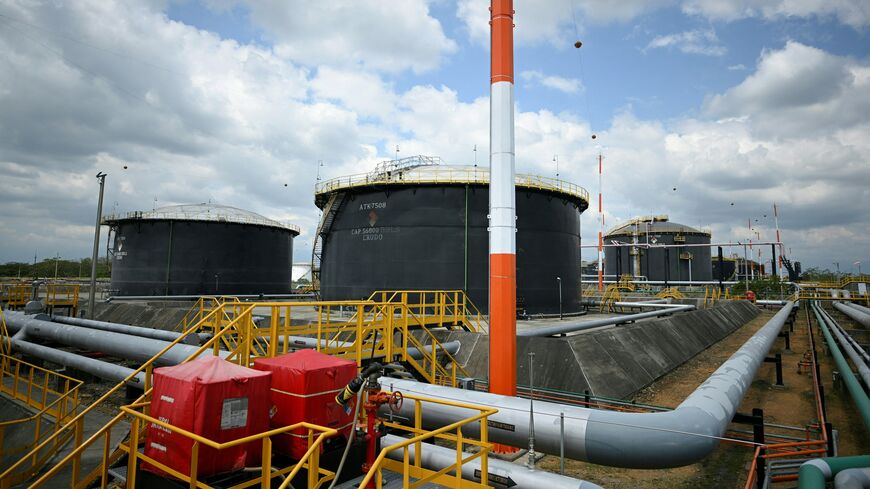Oil prices jumped more than 5% on Monday after the OPEC+ alliance announced plans to cut oil production by an additional 1.16 million barrels per day in a surprise decision that will likely exacerbate tensions with Europe and the United States.
Brent Crude rose 5.31% to $84.13 a barrel, its sharpest price increase in almost a year.
The move by the 23-member group including Saudi Arabia, Russia, Kuwait, the United Arab Emirates and Iraq came after the bloc said in October that it would maintain production cuts at 2 million bpd until the end of the year. OPEC+ accounts for about 40% of the world's crude oil output.
Following the announcement, combined oil cuts by OPEC+ members will add up to around 1.16 million bpd, bringing the total volume produced down to 3.66 million bpd, or 3.7% of global demand.
What happened: US crude rose $4.26 to $79.93 and Brent oil futures hiked up $4.48 to $84.37 a barrel, according to Oilprice.com on Monday at 4:27 a.m. ET, after reports that major oil producers will slash their output this year.
Major stock markets and company valuations in the Middle East rose in the early hours of Monday following the news. Saudi Arabia's benchmark index gained 0.8%, with Retal Urban Development SJSC rising by 1.5% and Dr Sulaiman Al-Habib Medical Services Group Co climbing by 1%. Meanwhile in the UAE, Dubai's main share index was up by 0.9% while Abu Dhabi's was up 0.4%. The Qatar index rose by 1.8%.
OPEC member countries with Russia and other allies issued statements on Sunday announcing that they will cut oil production from May until the end of 2023. UAE Minister of Energy and Infrastructure Suhail bin Mohammed Al Mazrouei said these cuts will come in addition to the reduction agreed at last year’s meeting.
"This voluntary initiative is a precautionary measure taken to ensure market balance and comes in alignment with the production cut agreed upon during the 33rd OPEC and non-OPEC Ministerial Meeting, held on 5th October 2022," the minister said in a statement.
The size cuts per country are as follows:
Saudi Arabia: 500,000 bpd
Iraq: 211,000 bpd
UAE: 144,000 bpd
Kuwait: 128,000 bpd
Kazakhstan: 78,000 bpd
Algeria: 48,000 bpd
Oman: 40,000 bpd
Why it matters: It was an unexpected move, given that OPEC+ had been expected to maintain total oil production cuts of 2 million bpd until the end of 2023. This move adds more than 50% in cuts (1.16 million bpd).
Dan Pickering, head of the investment firm Pickering Energy Partners, told Reuters on Sunday that these changes could lift oil prices by $10 per barrel.
Oil prices hovered at around $75 a barrel last month, according to Oilprice.com, as fears stirred that the global banking crisis would affect demand. Yet a correction to support the market was not expected, and crude prices recovered more recently building toward $80. These collective cuts by OPEC+ are seen as a way to guarantee that prices won’t fall below $80.
A Saudi Energy Ministry official said the sudden decision is a pre-emptive move in case of any possible reduction in demand, according to state-owned Saudi Press Agency. The United States cautioned against the decision by OPEC+ leadership and member countries.
“We don’t think cuts are advisable at this moment given market uncertainty — and we’ve made that clear,” a US National Security Council spokesperson said.
In October, the OPEC+ decision to cut 2 million bpd (2% of global demand) went against the US request to Saudi Arabia, the de facto leader of the oil producing group, to delay its decision to cut oil output by a month.
OPEC+ went ahead with the cuts that led President Joe Biden to vow consequences, adding to already strained relations between Riyadh and Washington.
The White House has called on the organization to increase its oil supplies in an effort to sanction Russian crude oil exports and economically choke the country since March 2022, just after the Russian invasion of Ukraine.
White House National Security Council spokesperson John Kirby told reporters Monday the output cut was “inadvisable.”
“This was an OPEC+ decision, not just some sort of unilateral decision by Saudi Arabia,” Kirby said. "Again, we don't find it advisable given market uncertainty, but we also don't have a seat at that table."
He admitted that the White House had been notified before the output cuts had been publicly announced.
Although Kirby said the Biden administration disagreed with the move by OPEC+, he sought to downplay any rift between Riyadh and Washington.
“We’re not always going to agree...with everything that Saudi Arabia does or says any more than they’re always going to agree with everything that we do or say, but that doesn’t take away from the fact that it is a strategic partnership,” he said.
Know more: Russia gave core OPEC+ members Saudi Arabia and the UAE unprecedented control over oil markets when it invaded Ukraine and was embargoed by the West. The United States has shown its discomfort with the leverage these countries have gained.


.jpg?h=484aaada&itok=l9O0K7bm)





